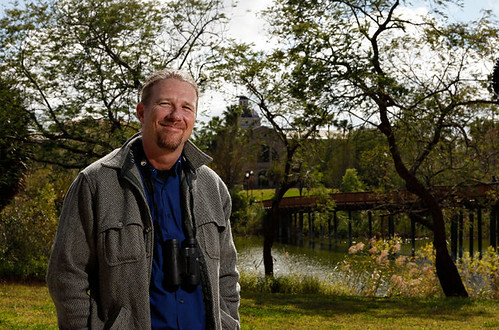 Dr. Karl Berg, an assistant professor of avian ecology in the Department of Biological Sciences at the University of Texas at Brownsville, has worked the last decade conducting research on the communication of parrots in South America.UTB avian ecology professor devoted to researching parrots.
Dr. Karl Berg, an assistant professor of avian ecology in the Department of Biological Sciences at the University of Texas at Brownsville, has worked the last decade conducting research on the communication of parrots in South America.UTB avian ecology professor devoted to researching parrots.
Dr. Karl Berg, an assistant professor of avian ecology in the Department of Biological Sciences at the University of Texas at Brownsville, has worked the last decade conducting research on the communication of parrots in South America.
Berg is working as part of an international team on a quarter of a century study begun by Steven Beissinger at the University of California, Berkeley in 1988 on the breeding, behavior and demographics of parrots at the Hato Masaguaral Biological Reserve and Research Station near Calabozo, Venezuela.
“Parrots are smart and it can be complicated to identify behavioral patterns,” said Berg. “They have extremely sharp and powerful bills mainly used to crack nuts. The larger macaws could also take off your finger.”
The study in Venezuela is a unique opportunity to study how parrots communicate in nature, said Berg.
“Because the birds have been painstakingly banded and followed for decades, today we know a lot about each individual,” he said.
Berg joined the UTB faculty earlier this month after serving for two years as a postdoctoral scholar in the Department of Environmental Science, Policy and Management at the University of California, Berkeley.
“Brownsville is a unique geographical position for a number of reasons,” said Berg. “There are more people that know about Brownsville in the ornithological sense than you might think.”
He said weather fronts and hurricanes in the Gulf of Mexico literally blow birds off their migratory course onto the mainland. The birds can be severely dehydrated and starving for hours or even days at sea.
“Brownsville is all about change,” said Berg. “In the fall birds are passing through to Central and South America where tropical habitats provide food during the harsh North American winter. In the spring they pass back through to exploit the plethora of food in the North American spring and summer.”
This semester he is teaching the lecture session for Ecology and the lecture and laboratory sessions for Ornithology.
“I want students to raise their conscience about the unique area they live in and how it’s influenced by the bigger picture,” said Berg.
His research has been published in the “Journal of Experimental Biology,” the “Proceedings of the Royal Society of London,” “Animal Behaviour” and the “Journal of Field Ornithology.” His research has been highlighted in “Science,” “Nature” and “The New York Times” among other news agencies.”
Berg grew up in central Florida and was involved in the Boy Scouts, which enabled him to camp and learn about nature.
“I think those early experiences are important,” he said.
Berg received a bachelor’s of business administration in 1989 from the University of North Florida in Jacksonville. He said an undergraduate ornithology class piqued his interest in outdoors and to pursue it through academia and research.
After graduating from UNF, Berg worked for three years in Ecuador as a field liaison with the U.S. Peace Corps coordinating conservation and wildlife research programs for the World Wildlife Fund, the U.S. Agency for International Development and other agencies.
He earned a master’s degree in biology in 2004 from Florida International University in Miami. While at FIU, Berg began seriously studying the vocal behavior of birds and has since accumulated millions of voice recordings for species common to North and South America.
In 2011, Berg earned his doctoral degree in neurobiology and behavior at Cornell University in Ithaca, N.Y. While at Cornell he was a Charles Walcott Fellow and an Andrew Paul Life Sciences Fellow.